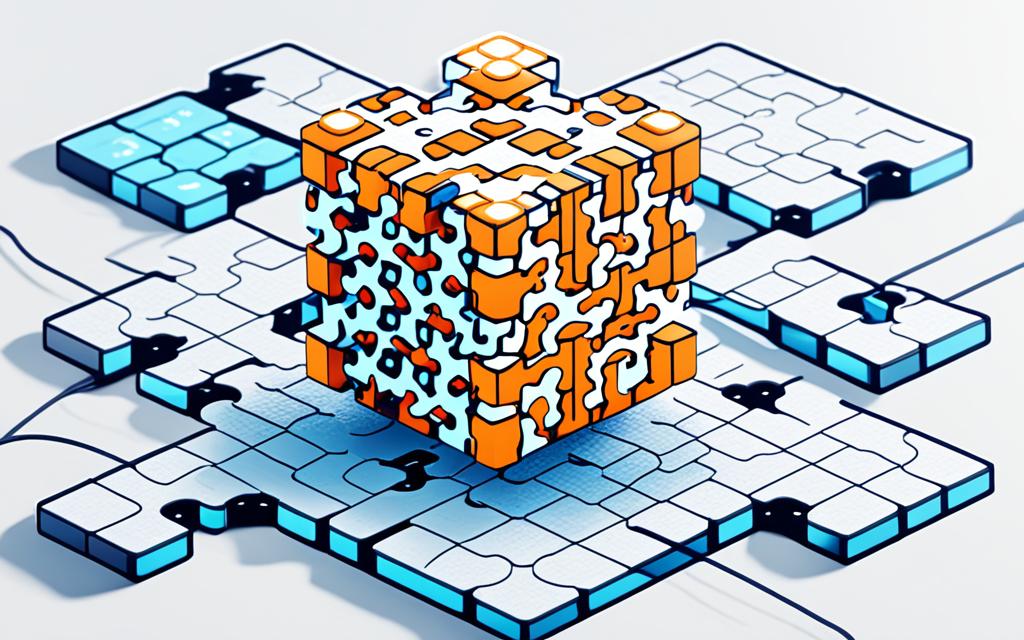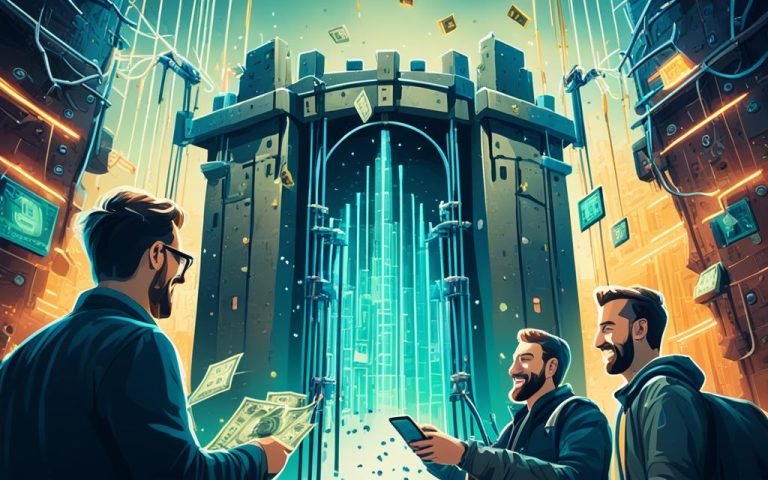Welcome to the exciting world of blockchain technology. This technology changes how we keep records, trust each other online, and protect our data. We’re going to explore how blockchain is making waves in various industries.
Blockchain is more than a cool term. It’s a way to store data across a network of computers. Though it started with Bitcoin, its use now goes far beyond digital money.
One great thing about blockchain is how it keeps data safe. It spreads information across many places, making it hard to change or hack. This safety comes from clever math and agreement rules, building trust in the online world.
Blockchains work without central control, removing the need for middlemen like banks. Trust starts when data is added. After that, everyone can see it, but no one can change it. This opens up a new level of honesty in online dealings.
Since Bitcoin showed up in 2009, blockchains have grown quickly. They’re now in industries like finance and digital art, through NFTs and smart contracts. These are cutting-edge tools that could change the world.
Next, we’ll dive into what blockchains are and how they work. We’ll look at their good points and their problems. By the end, you’ll know just how blockchain could change many areas of our lives.
What Is a Blockchain and How Does It Work?
A blockchain is a tech marvel that’s been getting a lot of buzz lately. But what is it, and how does it work? At its core, a blockchain is a special kind of database where data is stored in blocks and linked using cryptography. Unlike usual databases managed by one central figure, a blockchain is run by everyone in the network together.
One key thing about blockchain is it makes data permanent. This is big in blockchains without a central boss because trust comes from code, not people. Bitcoin uses this to keep payments safe and unchangeable.
Blockchains use tough math called cryptography to keep data safe and unchangeable. This makes it super hard for bad guys to mess with the info in the blockchain.
Now, how does a blockchain work? We’ll use Bitcoin as our guide:
1. Someone sends out a transaction, asking the network to check it.
2. Computers in the network check the transaction is okay.
3. After checking, the transaction gets mixed with others in a new block.
4. Miners race to solve a tricky puzzle to add this block to the blockchain.
5. When the block is added, the info in it is locked in forever, making the transaction complete.
This process keeps the network safe and stops people from trying to spend their digital money twice.
Why do people talk about blockchain so much? It’s because it could change a lot more than just money stuff. Its way of sharing control and locking in data securely could improve voting, track products, help prove who you are, and lots more. There are thousands of projects trying to use blockchain in new ways that could really shake things up.
Want to dive deeper into blockchain? Check out these cool resources:
- Investopedia: What Is Blockchain?
- Synopsys: Understanding Blockchain Technology
- Stanford Online: How Does Blockchain Work
Next, let’s check out the benefits and drawbacks of blockchain tech.
Benefits and Challenges of Blockchain Technology
Blockchain technology can change many industries with its benefits. It makes things safer and more efficient. It can change how we do business and keep our data safe.
Enhanced Security
Blockchain technology is very secure. It uses complex math to keep transactions safe. This means that the data is secure and honest, reducing fraud and hacking risks.
Blockchain is great for places that need to keep data safe, like banks or hospitals. It does not need middlemen or central control, making things more secure and less open to attacks.
Improved Accuracy
Blockchain creates a trusted and unchangeable record. Every action is recorded in order, making it easy to track and trust the data. This stops data from being changed wrongly, building trust.
This technology also makes sure everyone agrees on the transactions without needing a third party. This lowers the chance of mistakes or fraud.
Increased Efficiency
Blockchain uses smart contracts to make processes automatic. These contracts do things automatically once conditions are met. This makes transactions faster and cheaper than old processes.
It also allows for immediate transaction tracking and auditing. This makes operations more efficient and lets businesses focus on important work.
Challenges to Overcome
Blockchain faces some issues. Its networks need to handle more transactions faster and use less energy. People are worried about its effect on the environment.
There are also rules that need to be figured out. Governments want to make sure it’s safe and fair for everyone. As blockchain grows, these issues need to be solved.
Still, blockchain can offer a lot of good for different fields. As it gets better, it could overcome these challenges. This could let blockchain reach its full potential.
| Benefits | Challenges |
|---|---|
| Enhanced Security | Transaction Limitations |
| Improved Accuracy | Energy Consumption |
| Increased Efficiency | Scalability Issues |
| Regulation Concerns |
Conclusion
As our journey through blockchain technology ends, we see its massive impact. It’s changing industries like banking, cybersecurity, healthcare, and more. The rise of NFTs highlights its role as a truly transformative force.
There are different kinds of blockchains, each with special features. Public blockchains are fully open, while private ones control access. Hybrid blockchains mix the openness of public with the controlled access of private ones, offering a middle ground.
Despite its hurdles, blockchain is constantly growing. Its effects are felt across the globe, transforming how industries work. For more on how to end your writings with impact, explore these writing tips and strategies for effective conclusions.
Q: What industries can benefit from blockchain?
What is blockchain technology?
Blockchain is like a digital ledger spread across many computers. It safely keeps data in blocks that are cryptographically linked. This removes the need for middlemen.
What are the benefits of blockchain technology?
Blockchain offers high security with its cryptographic and consensus methods. It creates an immutable ledger for transparent records. Also, it cuts out middlemen and uses smart contracts for more efficiency.
Many sectors like banking, smart contracts, cybersecurity, health, logistics, and NFTs can use blockchain. It has diverse applications.
What are the challenges of blockchain technology?
Blockchain’s hurdles include limited transactions, high energy use, scalability problems, and regulatory issues.
What are the different types of blockchain?
Blockchain comes in types like public, private, consortium, and hybrid. Public chains are open to everyone. Private and consortium chains control access. Hybrids blend the features of public and private, offering limited openness.
How has blockchain impacted industries?
Blockchain has notably increased security, openness, and efficiency across various fields. It transforms how we keep records, make transactions, and automate processes.



















